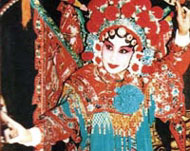 An English-dubbed Peking Opera, recounting the Chinese fairy tale Legend of the White Snake, was staged for an audience of hundreds of foreigners Saturday night in the auditorium of the China Drama Institute.
An English-dubbed Peking Opera, recounting the Chinese fairy tale Legend of the White Snake, was staged for an audience of hundreds of foreigners Saturday night in the auditorium of the China Drama Institute.
It is the first time that a performance of Peking Opera was simultaneously interpreted into English in different roles.
With earphones on his head, Fred Edwards, a Canadian working in China, said that although he has been an enthusiastic Peking Opera goer, he has never gotten so immersed in a performance until then.
On the choice of the repertoire for the first try at using this kind of dubbed opera, producer Cui Xiangrong said that Legend of the White Snake is one of the plays that can fully demonstrate all the expressions of artistry used in Peking Opera.
"Romantic love stories and the fight between good and evil are always appealing to audiences, besides, the original scenario written by renowned Chinese playwright Tian Han is of high literary value," said Cui.
"Peking Opera, which enjoys international reputations, would see a lot more foreign audiences, if the language barrier can be smoothed out," he said.
The endeavor of removing the language barrier over the art is not new. Over two decades ago, Elizabeth Wichmann-Walczak, professor of Asian Theater at the University of Hawaii in the United States, created an English-version Peking Opera. She performed an imperial concubine of Tang Dynasty singing in English.
Opera houses in Beijing also tried using English subtitles to help foreign audiences comprehend the plays.
Cui believed that a dubbed opera can preserve the authentic flavor of the art, while making it understandable to foreign audiences.
The new attempt seems to work. The audience was deeply moved by the romantic love story, and gave a thundering applause at the end of each episode.
The 200-year-old Peking Opera with its trademark mixture of lavishly embroidered costumes, florid facial make-up, high-pitched singing, and romantic dances is considered the best expression of China's art.
Ghaffar Pourazar, who dubs the role of Xu Xian for those English-speakers in the audience, is a fan of Peking Opera. After five years of training, Pourazar, who is British, has now become a professional opera player.
Foreign audiences are easily attracted by some elements in the art, such as the costumes, singing, actors' somersaulting and juggling, he said. However, most of them cannot go deeper into the art.
But they do now. Denise Henry from the United States said she was amazed by such romantic scenes as Xu Xian and the fairy boating on the West Lake and fairies using magical power to submerge the Jinshan Temple to rescue Xu Xian. They are so wonderfully adapted on the opera stage, she said.
Pourazar considers the English version basically equivalent to the original play and sounds poetic.
As China's first Peking Opera artist to open a company for promoting dubbed opera performances, Cui Xiangrong said that he came up with the idea six years ago, and founded the Onetone Culture Exchange Co. last year to make it his career.
He believed that dubbed Peking Opera will have a huge market. "Some two million overseas tourists visit Beijing every year, and my market research suggests that many of them would like to go to opera houses as part of a must-see tourist stop. Dubbed Peking Opera is sure to become hot," he said.
(Xinhua 04/21/2001)
